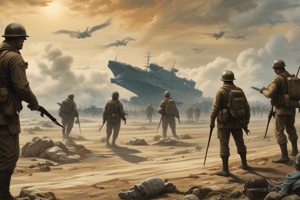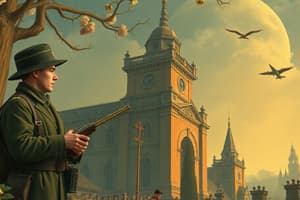Podcast
Questions and Answers
¿Qué acontecimiento durante la Segunda Guerra Mundial fue clave para ralentizar el avance de las tropas de la Wehrmacht en Rusia?
¿Qué acontecimiento durante la Segunda Guerra Mundial fue clave para ralentizar el avance de las tropas de la Wehrmacht en Rusia?
- Campaña en Francia en mayo de 1940
- Batalla de Stalingrado de agosto de 1942 a enero de 1943 (correct)
- Invasión del Día D en junio de 1944
- Bombardeos atómicos en Hiroshima y Nagasaki en agosto de 1945
¿Qué país sufrió pérdidas masivas debido a su proximidad a potencias hostiles durante la Segunda Guerra Mundial?
¿Qué país sufrió pérdidas masivas debido a su proximidad a potencias hostiles durante la Segunda Guerra Mundial?
- Francia
- Japón
- Polonia (correct)
- Estados Unidos
¿Quién fue el líder del Tercer Reich cuya política exterior agresiva desencadenó finalmente el conflicto?
¿Quién fue el líder del Tercer Reich cuya política exterior agresiva desencadenó finalmente el conflicto?
- Adolf Hitler (correct)
- Franklin D. Roosevelt
- Winston Churchill
- Josef Stalin
¿Quiénes fueron los representantes de las tres principales alianzas durante la Segunda Guerra Mundial, respectivamente, que planearon estratégicamente la participación y victoria de sus países?
¿Quiénes fueron los representantes de las tres principales alianzas durante la Segunda Guerra Mundial, respectivamente, que planearon estratégicamente la participación y victoria de sus países?
¿Qué figura fue conocida por sus tácticas innovadoras y espíritu combativo tenaz durante la Segunda Guerra Mundial?
¿Qué figura fue conocida por sus tácticas innovadoras y espíritu combativo tenaz durante la Segunda Guerra Mundial?
¿Cuáles fueron algunas de las razones interconectadas que alimentaron el estallido de la Segunda Guerra Mundial?
¿Cuáles fueron algunas de las razones interconectadas que alimentaron el estallido de la Segunda Guerra Mundial?
¿Qué evento marcó la fecha oficial de inicio de la Segunda Guerra Mundial?
¿Qué evento marcó la fecha oficial de inicio de la Segunda Guerra Mundial?
¿Cuál fue una consecuencia directa del establecimiento de regímenes fascistas liderados por Hitler y Mussolini antes de la Segunda Guerra Mundial?
¿Cuál fue una consecuencia directa del establecimiento de regímenes fascistas liderados por Hitler y Mussolini antes de la Segunda Guerra Mundial?
¿Qué característica definió la 'campaña relámpago' ('Blitzkrieg') llevada a cabo por los alemanes durante la Segunda Guerra Mundial?
¿Qué característica definió la 'campaña relámpago' ('Blitzkrieg') llevada a cabo por los alemanes durante la Segunda Guerra Mundial?
¿Qué factor contribuyó significativamente a la inestabilidad económica global que precedió a la Segunda Guerra Mundial?
¿Qué factor contribuyó significativamente a la inestabilidad económica global que precedió a la Segunda Guerra Mundial?
Flashcards are hidden until you start studying
Study Notes
Second World War: An Overview
The Second World War was one of humanity's darkest chapters, spanning from September 1, 1939, until September 2, 1945. This global conflict engulfed nearly every continent and involved multiple complex factors that contributed to its devastating course. Let's explore these facets more closely.
Causes
Several interconnected reasons fueled the outbreak of this war, including nationalism, territorial expansion, political tensions, economic crises, and social upheavals. In particular:
- Rise of fascist regimes: Authoritarian leaders such as Adolf Hitler and Benito Mussolini established totalitarian systems that threatened neighboring nations and encouraged militaristic aggression.
- Punitive Versailles Treaty: Germany's post-World War I treaties led to great bitterness among German people, weakening democracies while emboldening extremists like Nazi parties seeking revenge.
- Economic instability: Global depression following the Wall Street Crash of 1929 destabilized economies worldwide, intensifying competition over resources and creating fertile soil for geopolitical tensions.
Major Events
Key battles and turning points throughout history's bloodiest conflict included:
- Invasion of Poland (September 1, 1939): The official start date of WWII when Germany invaded Poland without declaring war.
- Blitzkrieg campaign: A rapid series of military offensives by the Germans through Western Europe. Notable campaigns were those into France (May 1940) and Belgium and Luxembourg (June–July 1940).
- Battle of Stalingrad (August 1942 – January 1943): One of the largest confrontations involving close combat between Soviet and German forces during WWII. It proved pivotal in slowing down the advancement of Wehrmacht troops into Russia.
- D-Day Invasion (June 6, 1944): Allied landings in Normandy, considered one of the most significant operations of the war, which eventually helped lead to the liberation of western Europe from Nazi rule.
- Hiroshima and Nagasaki atomic bombings (August 6 & August 9, 1945): These nuclear attacks ended the Pacific War against Japan and signaled the dawn of the Atomic Age.
Impact on Countries
WWII drastically altered the landscape of many nations:
- Britain: Initially under threat of invasion, Britain later emerged victorious thanks to strong wartime leadership and ardent support from its citizens, hastily rebuilding itself into a world power.
- Poland: Suffered immense losses due to its proximity to hostile powers, resulting in a shift in demographic makeup and loss of territory.
- France: Experienced occupation by German forces, enabling French Resistance groups to fight back while setting conditions for future reforms.
- USA: Initially neutral, America entered the fray midway through the conflict before emerging as an unquestioned industrial and military superpower.
- Germany: Although defeated, it experienced fundamental changes, giving rise to West Germany, East Germany, and subsequent reunification in the late '90s.
- Japan: Devastated by American firepower, leading to its surrender and subsequent occupation by US authorities.
Key Figures
Many prominent personalities played crucial roles in shaping the outcome of the war:
- Adolf Hitler: Leader of the Third Reich whose aggressive foreign policy ultimately sparked the conflict.
- Churchill, Roosevelt, Stalin: Representatives of the three main alliances who strategically planned their respective country's involvement and eventual victory.
- Marshall Tito: Founder of Yugoslavia's Communist Party and a vital figure in resisting German advances.
- Gen. George Patton: United States Army general known for his innovative tactics and tenacious fighting spirit.
Aftermath
In addition to enduring physical destruction and enormous death tolls worldwide, the conclusion of WWII brought about profound shifts in international relations, politics, economics, and society:
- Cold War era: Relationships between former allies evolved into a standoff between communist and democratic ideologies, a tension that would last for decades.
- Nuremberg Trials: International tribunal held to prosecute high-ranking members of Nazi Germany for crimes perpetrated during the war.
- United Nations: Establishment of a new organization aimed at fostering peace and cooperation among member states.
- European Union: Precursor organizations laid groundwork for future integration within modern EU.
- Decolonization: Several European empires began dismantling colonial structures in pursuit of self-determination for formerly colonized regions.
Studying That Suits You
Use AI to generate personalized quizzes and flashcards to suit your learning preferences.




